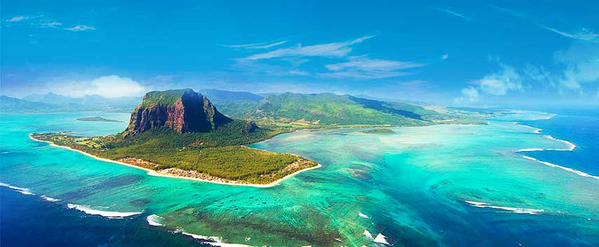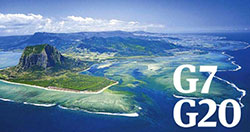Barkha Mossae is a Mauritian diplomat for the Ministry of Foreign Affairs and is a keen advocate of environmental diplomacy. She became a One Young World Ambassador in 2012 and is a passionate campaigner for the sustainable development of Small Island Developing States (SIDS).
[[[image 0 - native]]]
The pivotal UN Sustainable Development Summit and the 70th meeting of the UN General Assembly (UNGA 70) begins on 25 September and will determine the direction taken on global development, by agreeing on a new set of 17 global Sustainable Development Goals (SDGs).
These goals, clustered around the principles of people, peace, prosperity, planet and partnerships, will replace the expiring Millennium Development Goals (MDGs). However, the SDGs will be more than a mere extension of the MDGs. They establish a different dynamic; an awareness of the necessity for innovative financing beyond donor-recipient relations and beyond government sources; greater accountability in the face of social media scrutiny and, more crucially, greater scope for participation and co-creation by non-governmental actors.
The MDGs had a heavy focus on poverty eradication and targeted mainly developing countries. They triggered unprecedented momentum for the cause, by providing eight goals around which governments, donors and development partners could rally. These goals provided a broad policy framework for development that is still valid. However, success in achieving the MDGs has been mitigated amid criticisms that the eight goals were arbitrarily agreed upon by a few people at the UN and then presented to governments with little consultation. It is therefore understandable that the path to the UNGA 70 is peppered with pessimism.
In contrast, there are many reasons to believe that the SDGs will have a resounding impact. The SDGs will be “integrated and indivisible”, as per the outcome document of the UN Summit;Transforming our World: The 2030 Agenda for Sustainable Development. This already represents a significant effort in rationalising key developmental concerns into 17 compact goals and 169 targets, relevant to the whole world rather than just the developing one.
The economic downturn is behind us, and it served to show that the achievement of cross-cutting goals related to poverty eradication, inequality and human rights is inextricable from the way we do business. Furthermore, the way the 17 SDGs were formed is indicative of a different approach. Since the 2012 UN Conference on Sustainable Development (Rio+20) launched the multi-track processes towards the post-2015 agenda, worldwide consultations have been a modus operandi to the development of the new set of goals. The My World survey, in addition to multisectoral outreaches to youth, civil society, businesses and disenfranchised groups, made an unprecedented effort to tap into a multiplicity of voices.
The short timeframe of 15 years does not speak of short-termism in policymaking; instead, it saves the present generation from ossifying a set of developmental concerns that may become contextually obsolete in the next few years. In addition, the speed and disruptive potential of social media has handed us the tools to ensure accountability and promote innovation in the way we tackle the different SDGs.
The SDGs are only as strong as our faith in, and contribution to, them. In our present connected societies, they are no longer the reserve of a select group of government officials and multilateral technicians. Unencumbered by bureaucracy, every citizen, and particularly every millennial, now has the chance to pioneer sustainable development. Let’s do it.
Goal 1 ;End poverty in all its forms everywhere
Goal 2 ;End hunger, achieve food security and improved nutrition and promote sustainable agriculture
Goal 3 ;Ensure healthy lives and promote wellbeing for all at all ages
Goal 4 ;Ensure inclusive and equitable quality education and promote lifelong learning opportunities for all ;
Goal 5 ;Achieve gender equality and empower all women and girls
Goal 6 ;Ensure availability and sustainable management of water and sanitation for all
Goal 7 ;Ensure access to affordable, reliable, sustainable and modern energy for all
Goal 8 ;Promote sustained, inclusive and sustainable economic growth, full and productive employment and decent work for all
Goal 9 ;Build resilient infrastructure, promote inclusive and sustainable industrialisation and foster innovation
Goal 10 ;Reduce inequality within and among countries
Goal 11 ;Make cities and human settlements inclusive, safe, resilient and sustainable
Goal 12 ;Ensure sustainable consumption and production patterns
Goal 13 ;Take urgent action to combat climate change and its impacts*
Goal 14 ;Conserve and sustainably use the oceans, seas and marine resources for sustainable development
Goal 15 ;Protect, restore and promote sustainable use of terrestrial ecosystems, sustainably manage forests, combat desertification, and halt and reverse land degradation and halt biodiversity loss
Goal 16 ;Promote peaceful and inclusive societies for sustainable development, provide access to justice for all and build effective, accountable and inclusive institutions at all levels
Goal 17 ;Strengthen the means of implementation and revitalise the global partnership for sustainable development
*Acknowledging that the United Nations Framework Convention on Climate Change is the primary international, intergovernmental forum for negotiating the global response to climate change.

